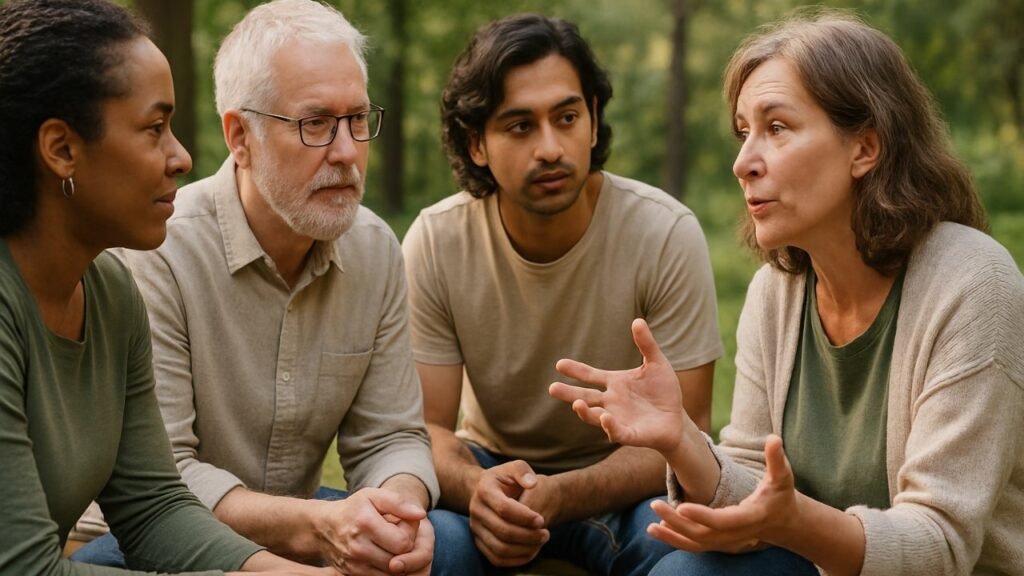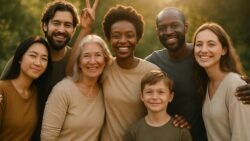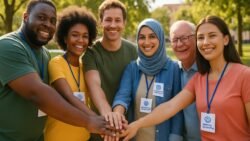Conflict Resolution and Human Rights Advocacy– Our approach to conflict resolution and human rights advocacy at the grassroots level is rooted in inclusivity, empathy, and empowerment. We believe that real transformation begins when communities most affected by conflict are given the tools, knowledge, and platforms to address their challenges. Grassroots initiatives are not only more sustainable but also more responsive to cultural and social dynamics. By engaging local leaders, women, youth, and marginalized groups, we create an environment where every voice matters in the peacebuilding process. Conflict resolution at this level focuses on dialogue, restorative practices, and building mutual trust rather than imposing external solutions. Human rights advocacy is equally vital, as it ensures that the dignity and freedoms of individuals remain central in all discussions. Through training, awareness campaigns, and participatory approaches, we aim to prevent violence before it escalates and foster a culture of respect. Our work emphasizes collaboration with existing structures and amplifying community-driven solutions to create lasting impact.

Building Community-Led Peace Mechanisms
Building community-led peace mechanisms is a cornerstone of our grassroots strategy. We focus on strengthening traditional systems of conflict resolution while integrating modern principles of human rights. Local mediators, elders, and women’s groups are often the first responders to disputes, and empowering them enhances both trust and accessibility. By providing training on negotiation, mediation, and human rights frameworks, we ensure that these actors are equipped to resolve disputes fairly and effectively. This approach reduces dependency on overstretched legal systems and promotes faster, culturally sensitive resolutions. Moreover, it encourages shared ownership of peace initiatives, reducing the likelihood of recurring conflicts. Studies show that grassroots mediation significantly lowers the risk of violence escalation in fragile settings (UN Peacebuilding Support Office). By linking community mechanisms to broader national frameworks, we create a bridge that strengthens social cohesion and ensures grassroots voices influence policy. This holistic approach ensures long-term stability while respecting local traditions.
Promoting Human Rights Through Grassroots Advocacy
Promoting human rights at the grassroots level requires a dual approach of education and empowerment. We engage communities in interactive workshops, storytelling, and awareness campaigns that help people understand their rights and how to protect them. Marginalized groups often face systemic barriers, and grassroots advocacy provides them with tools to challenge discrimination and access justice. Our focus on rights education ensures that individuals understand key international frameworks such as the Universal Declaration of Human Rights, while also contextualizing these rights within their daily realities. Advocacy also involves mobilizing communities to hold local institutions accountable, ensuring transparency and fairness in governance. By fostering partnerships with civil society organizations, we create networks of solidarity that amplify community voices. Evidence from organizations like Human Rights Watch shows that community-based advocacy has been pivotal in advancing reforms and preventing abuses. Through these efforts, we aim to shift power dynamics and build inclusive societies where rights are respected.
 An Overview of UFDP’s Journey – From Local Initiatives to Global Impact in Peace and Empowerment
An Overview of UFDP’s Journey – From Local Initiatives to Global Impact in Peace and Empowerment
Empowering Women and Youth in Conflict Resolution
Women and youth play critical roles in grassroots peacebuilding, yet they are often excluded from formal decision-making processes. Our approach actively involves these groups by creating platforms where they can lead initiatives, mediate conflicts, and advocate for their rights. Women’s perspectives bring unique insights into peacebuilding, often emphasizing reconciliation, healing, and social cohesion. Youth, on the other hand, bring innovation, energy, and resilience, making them vital in sustaining long-term peace. Programs tailored to build their leadership skills, such as mentorship, entrepreneurship training, and civic engagement, ensure that they become active agents of change. Global studies by UN Women highlight that women’s participation in peace processes increases the chances of durable peace agreements by 35%. Similarly, youth involvement reduces the risk of radicalization and violence. By investing in these groups, we not only strengthen conflict resolution mechanisms but also create a future generation committed to justice, equality, and peace.
 How UFDP Trains Peace Ambassadors and Local Leaders to Foster Unity Across Diverse Communities
How UFDP Trains Peace Ambassadors and Local Leaders to Foster Unity Across Diverse Communities
Strengthening Collaboration and International Solidarity
Grassroots advocacy does not exist in isolation—it thrives when linked with national, regional, and international solidarity. We prioritize collaboration with governments, NGOs, and global institutions to scale community voices and translate local solutions into policy change. International partnerships help secure resources, technical expertise, and global visibility for grassroots struggles. At the same time, these collaborations reinforce accountability mechanisms, ensuring that human rights violations are documented and addressed. Initiatives such as the Amnesty International campaigns demonstrate how global solidarity amplifies grassroots movements, turning local struggles into international calls for justice. We also emphasize knowledge exchange between communities across regi


